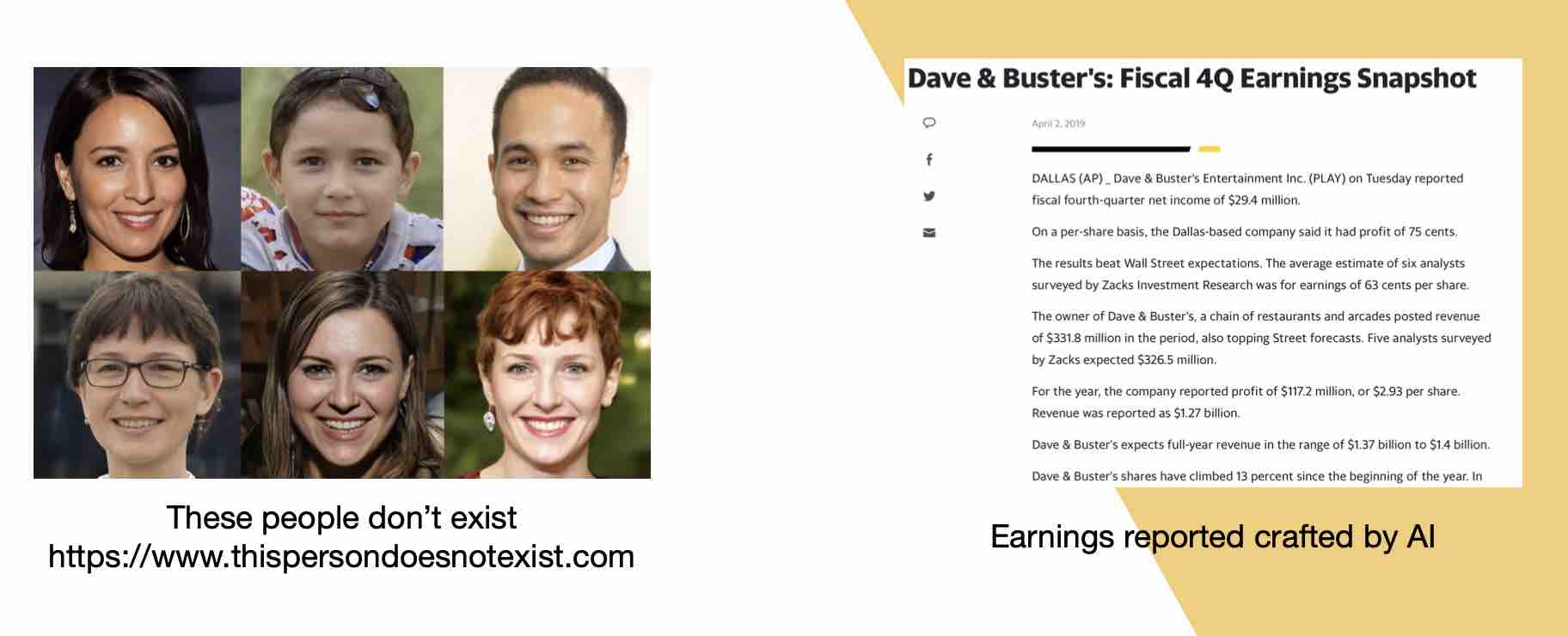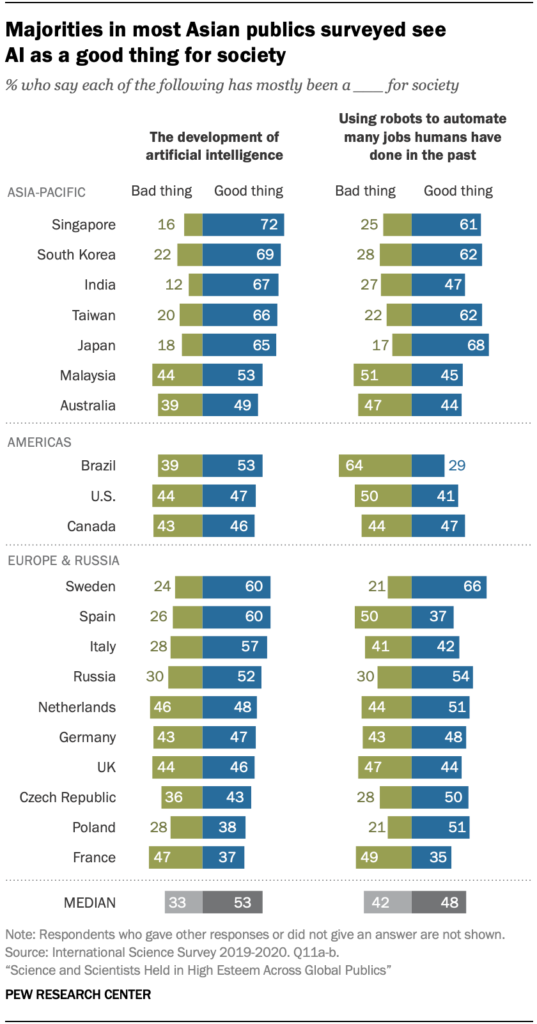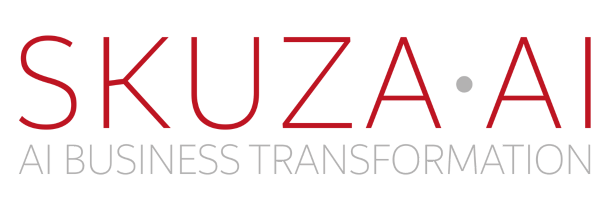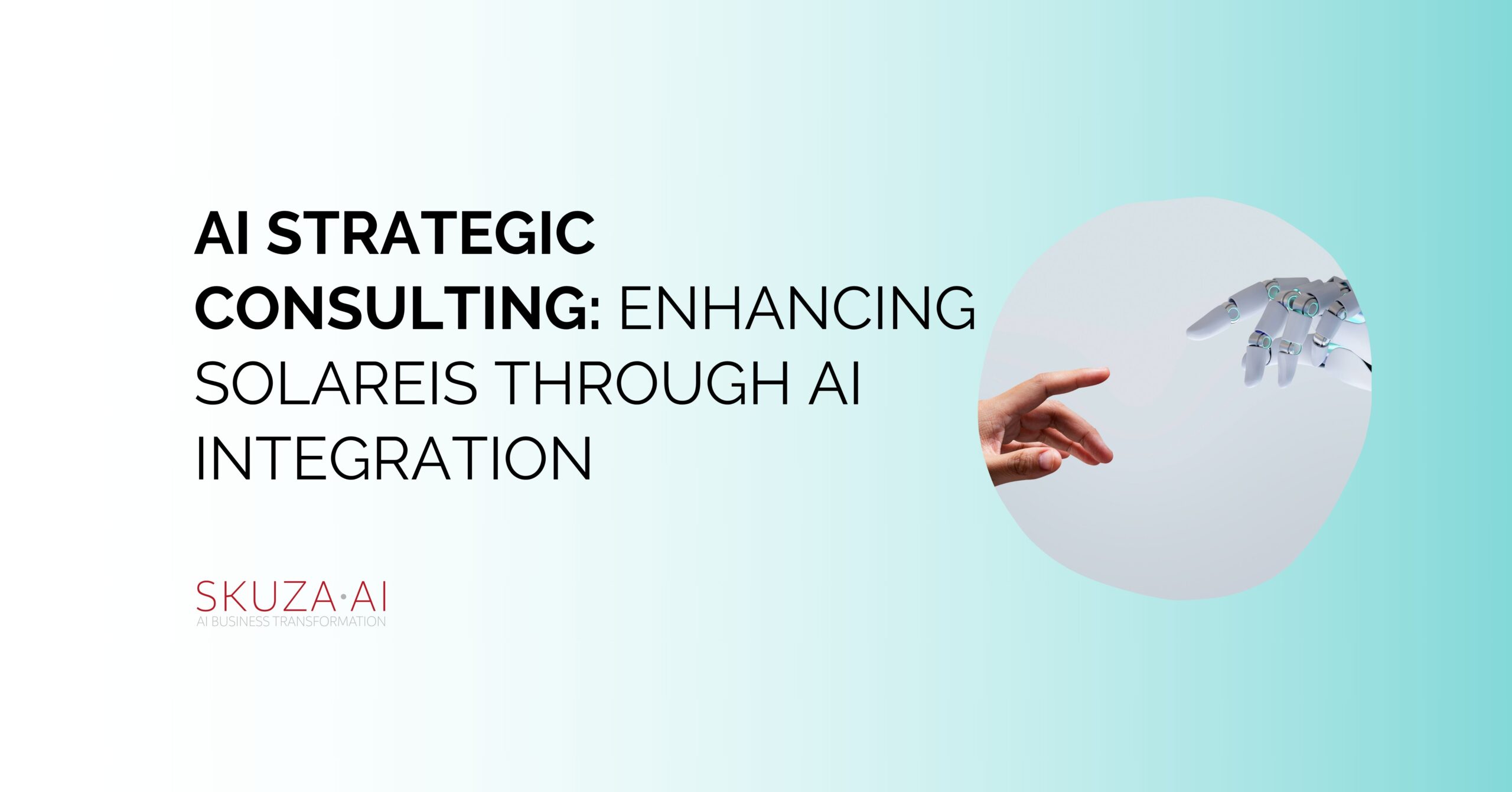As with most life transitions, there will be positive and negative ways in which artificial intelligence benefits society. One thing is 100% true, artificial intelligence radically transforms the world we live in.
How that will influence the world around us is anyone’s guess and up for much debate. As an optimist at heart, I believe the opportunities that AI will introduce will mostly be good.
The transformative impact of AI on our society will have far-reaching financial, legal, political, and regulatory consequences that the world needs to be prepared for.
Ethics, honesty, accessibility, transparency, and data privacy are essential topics that will be even more important when AI will accelerate growth and open new opportunities. Decisions made or supported by AI must be transparent and accountable, as well as fair and non-discriminatory.
A significant bottleneck for adopting artificial intelligence in society is the lack of specialists at all levels. Continuous learning and different approach to education were identified as critical challenges to the societal effects of AI. Moreover, the successful implementation of artificial intelligence in society requires that the general public recognizes new applications as trustworthy and ethical.
Artificial intelligence and its impact on the global economy
AI will contribute almost $16 trillion to the world economy by 2030, according to a PwC report. Gains will come as follows:
- $7 trillion from improved productivity as companies automate processes
- $9 trillion from consumption as shoppers will enjoy more massive customization (products are highly customized but still commoditization is possible. It makes the cost lower and scalability faster)
According to the authors, global GDP, which equaled about $74 trillion in 2015, will be 14% higher in 2030 due to artificial intelligence development. This is a huge change that defines what are artificial intelligence benefits to society.
PwC found out that tremendous economic gains from AI will happen in China (almost 30% boost to GDP in 2030) and North America (14.5% increase of GDP by 2030).
The next wave of the AI-driven digital transformation has its roots in data generated through the Internet of Things (smartphones, cars, thermostats, watches, robots, manufacturing machines).
The outcome is:
- more standardization,
- more automation,
- intensified product and service personalization.
The following pictures show two examples of the outcomes we can receive—artificial intelligence benefits society by creating digital content with a high level of personalization. On the left, we can see faces that don’t exist. Marketers can use them in ads, commercials, and videos. Instead of taking pictures of real people, artificial intelligence can design faces, which substantially lowers the cost of marketing campaigns.
On the right side, there is an example of financial report, which artificial intelligence wrote from scratch.

Artificial intelligence will redesign how routine tasks are performed, especially in capital-intensive areas, including transport and manufacturing. The impact on society will be enormous as many jobs, based on copy/paste tasks, will not be available to humans anymore.
Companies will also boost productivity, and they will enhance and support their workforce in improving performance by using AI applications. A good example is artificial intelligence used in messaging apps. It used to be about picking up a phone and helping customers, answering questions, conducting training sessions, and so on. No algorithms can receive phone calls and provide 24-hour uninterrupted customer care support.
It reduces human interference and exposes society to new challenges like answering the higher demand for more skilled labor. Besides, it reduces the cost associated with repetitive tasks. It means that the workforce has more time and opportunity to develop new skills and get qualifications for performing higher-value tasks.
According to the World Economic Forum report, 85 million jobs can be replaced by AI-powered machines and software by 2025. While this may seem like a shocking statistic, the same report states that AI will create 97 million new jobs by 2025. It will be just a structural change that society can leverage.
Artificial intelligence benefits to society are enormous
I grouped use cases into several social impact areas based on my projects for customers, research, and conversation with top-level executives, mostly my customers.
There are many different use cases and examples where artificial intelligence can play an important role in crisis response to early detection of plant damage and improve yield in small farms. Business and science can apply AI in the financial sector, healthcare sector, and many more. Artificial intelligence is one of a kind technology that can scale across industries (horizontal), inside the industry (vertical), can be offered as a service (AIasS), or installed into hardware.
Society can benefit from AI in the following areas:
- Safety and justice. Challenges in society involve harm, abuse prevention, tracking criminals, and mitigating bias of law enforcement units. This type of AI implementation focuses on protection, guarding, and criminal justice issues as human trafficking or drug crime. An example is using AI to create solutions that help police determine hot spots where crimes are about to happen.
- Public sector management. Projects related to public entities’ performance and effective administration, including solid transparency and intelligent financial management. For example, governors, public servants, and clerks can use AI to identify tax fraud using alternative data points such as social media data, browsing data, and retail payments history. Another instance where AI can prove effective is in providing automated question answering via intelligent chatbots to improve citizens’ experience with the government.
- Infrastructure administration. Infrastructure hurdles that could improve the usage of energy, water, and waste management are among the top areas that Ai can improve. For example, weather sensors can be optimized using real-time data and control the angle of solar panels. Infrastructure management organizations can also use AI for predictive maintenance of wind farms to identify potentially malfunctioning components.
- Information and data validation. This area focuses on filtering or checking facts that could mislead. Pandemic shows how important that could be in vaccination rate. Social media and the Internet overall have an enormous impact on shaping people’s opinions. Use cases in this domain include actively checking the facts and science behind the specific topic. Twitter implemented an algorithm that asks people to read the article before making the retweet. Facebook is checking millions of articles and looks for harmful statements or hate speech. Cities need to be also very careful about sharing content which social media users might compromise.
- Hunger and health. Addressing hunger challenges is mostly about logistic chains, food distribution, and last-mile deliveries. Logistic companies can use data to train artificial intelligence models which become capable of prioritizing shipments. Also, considering weather conditions, it’s possible to predict drought spots and address food shortage before it happens. Researchers and physicians use AI to determine whether the specific cells are cancerous or check the X-Ray images to spot diseases.
- Equality, inclusion, and bias. It is a vast topic as it is universal. A good example is in the HR analytics domain, where machine learning algorithms group candidates into potential hires and rejections. Researchers explained in the academic paper here that in the US labor market, African-American names are discriminated against. In contrast, applicants with common names in white people’s communities receive more callbacks for interviews. The situation happens because machine learning and deep learning algorithms have been seasoned on biased data where training samples for white candidates being successful are much greater than that of color candidates. Artificial intelligence can solve this issue by providing recruiters with data and uncover discrimination.
- Environment and wildlife. Artificial intelligence helps protect nature and our environment, which is critical to humankind. An interesting use case is how the National Oceanic and Atmospheric Administration monitors populations of endangered species in the polar areas, including beluga whales, ice seals, and polar bears. They conduct the project by utilizing camera-equipped airplanes. Another good example is WildTrack. It is a tool for non-invasive tracking of endangered species through digital photographs of footprints. Scientists analyze measurements from these images and identify the species, individual, sex, and age class.
What is our role in an AI-driven world? How can we bring more artificial intelligence benefits to society?
Education
Machines can mimic a lot of things, but they don’t know what it is like. For example, if I’m writing a song, I can get a sense of how it would feel for people to hear the song by reading my own words. Or if I write a book, I can see if it’s funny enough. Machines (algorithms) can’t do it. In principle, AI could superficially learn by learning three million best-selling songs and three million non-successful songs. Artificial intelligence would try to learn a specific thing and suggest the change. But that’s not the same as actually finding whether people will enjoy the song. The machine doesn’t see it as entertaining. It doesn’t know. In the more complex settings of interpersonal relationships, I think we have this comparative advantage. This is, in my opinion, the core of what we need to do to ensure AI will be helpful for society. Because it can’t feel, show empathy and judge so many things, we need to make sure we introduce AI to society properly.
In my area, health, there is enormous potential in the confluence of advances in big data study and genomics to create personalized medicine and enhance diagnosis, therapy, and research. I am confident that the human capacity for adaptation, learning, and evolution, and technological innovation will not always proceed smoothly. For this reason, we need to make sure people understand how artificial intelligence works.
Finland launched a free online course in artificial intelligence to educate its citizens about machine learning, deep learning, and more. European Union is launching the same thing for its citizens.
In many countries, artificial intelligence is considered a threat, and in my opinion, if there are more courses and training available, it helps to understand how to make sure artificial intelligence benefits to society.

This capacity to use AI for discovery has been extended not only by the massive increase of digital data and available computing power but also by innovations in AI and ML algorithms. The thing is, AI is everywhere. It is built into cars, watches, microwaves, and electric drills. It’s good if people understand what it means AI is there. What kind of expectations we can have. Why protecting our data is essential for AI to maximize product efficiency.
Standards
Many countries have published national artificial intelligence strategies and policy initiatives, which usually try to ensure a leadership position in AI. The strategy and initiatives set aspirations and targets that expect collective action by all stakeholders. Governments’ role is often as a convener and facilitator. Companies try to conduct R&D efforts and maximize the return of investment. Charity and other organizations are expecting free access to recommendations and other outcomes to optimize their business and processes. Standard in conducting artificial intelligence research and development could help all parties synchronize their effort, use funds properly and share the findings. Countries need to take care of their citizens since AI is everywhere; by setting up standards, political leaders maximize the benefits. Artificial intelligence can deliver different results, empower selected industries. It needs priorities as it is expensive to train AI models to do everything. For this reason, standards are critical as they set directions for all important players.
Data protection
The influence of big data is commonly described in terms of 3Vs: volume, variety, and velocity. More, good quality data makes analysis more compelling and more granular. Variety contributes to this power and enables new and unanticipated inferences and forecasts. Velocity enriches research as well as sharing in real-time. Flow of data from mobile phones and other devices boost the volume, variety, and velocity of information about every dimension of our lives and put privacy into the spotlight as a global issue.
Facial recognition software allows a preview of the privacy issues that emerge. With the benefit of rich databases of digital photos reachable via social media, websites, driver’s licenses, surveillance cameras, and other sources, machine recognition of faces has progressed rapidly from fuzzy images of dogs and cats to fast recognition of individual humans. The idea became an essential element of the whole data puzzle.
Face recognition is only an example. Any time we click something, fill-up the form, record video, and upload it to youtube, we are feeding algorithms that then can chew our data up. Amazon bookstores “ask” for taking a picture of the book cover to uncover the price.
If software creators use personal data to build an AI technology without first collecting opt-in consent, everything must be done to further empower individuals to understand and control how their data is used.
Bias
Societal AI bias happens when an artificial intelligence works in ways that reveal social intolerance or institutional discrimination. At first look, the machine learning or deep learning algorithms and data themselves may appear unbiased, but their outcome reinforces societal biases. Societal bias in artificial intelligence is challenging to identify and hunt. It’s also everywhere. A good example is a recent analysis of how sports commentators debate about white and Black athletes. The authors noticed that commentators tended to focus on hard work and talent when talking about white athletes. In contrast, commentators talk about Black in terms of their “God-given ability.”

The study authors examined more than one thousand game broadcasts dating back decades to understand different racialized communication examples. It turned out there were plenty of them. Black-skinned players were more likely to be named via their first name and white athletes by their last name. Commentators described black-skinned players in terms of their “natural gifts” and physical attributes (“beast”) and white-skinned players in terms of their performance and intellect (“smart”).
AI bias is an anomaly in the output of machine learning algorithms. These could be due to the discriminatory assumptions made during the training data’s algorithm development process. The situation brings up a vital issue: it is critical to understand how the artificial intelligence algorithms make decisions, their input factors, and their influence on the outcome.
Conclusion
Artificial intelligence can do a lot of good in the world, but whether it does so depends on how we utilize and build those technologies in the first place. The unfortunate truth is that personal data has become bricks and mortar used to create many artificial intelligence-powered solutions. More thought and research need to be applied to how this personal data is appropriately protected and safeguarded.
To use personal data to develop AI technologies requires a re-examination of existing legal and ethical principles and frameworks as applied to the facts of the given research project.
At such time, efforts must then be made to ensure that all is done to protect the individuals whose personal data is used to develop artificial intelligence-driven technologies. This is achieved by evaluating the value of the AI technology, empowering individuals, and establishing a safe and healthy data architecture to create the AI technology. All of this needs to be done to maximize the number of ways in which artificial intelligence benefits society.

